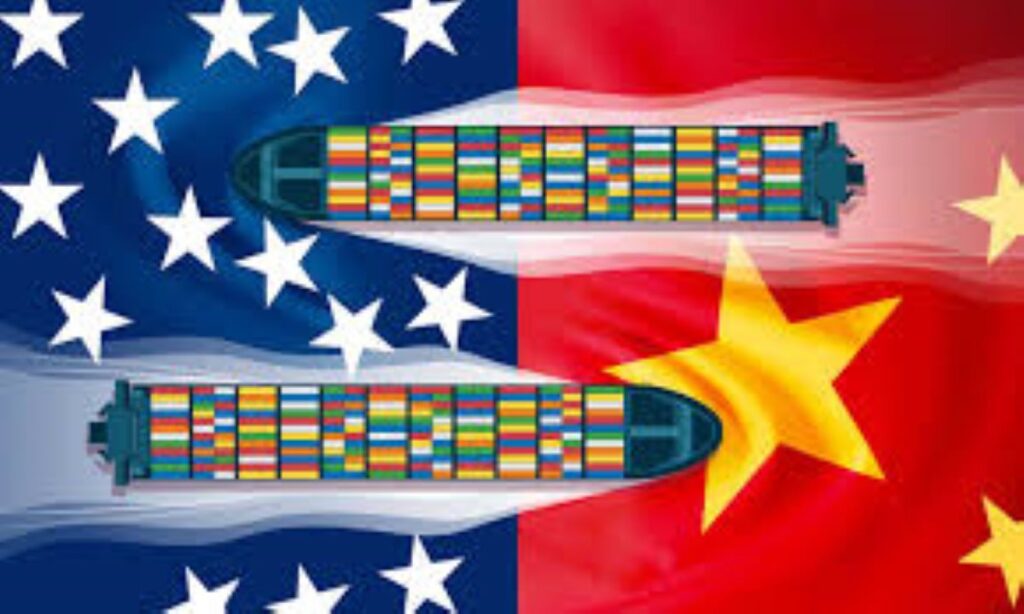As much as it’s fun to watch two kids bickering over a chocolate, the amusement takes a back seat when it’s the world at stake. The current trade war may have started with the US announcing the “reciprocal tariffs” against the nations that imposed tariffs on the US; however, the dispute has taken a turn since China fought back, fluctuating not only the stock market but also the heartbeat of retail investors.
According to the WTO ideals and rules, there was a reason that the current global economic system was in place, where a certain tariff is decided for each country. However, imposing the reciprocal tariff is not only undermining WTO rules but also jeopardising the financial security and destabilising the economic order.
US’ Stance on the ‘Reciprocal Tariff’: The Ongoing Trade War
US’ ‘reciprocity’ as claimed, is not based on the equal treatment or to compensate the losses that they have ‘apparently’ suffered in the international market, but rather comes from a place of personal interests. The imposition of such tariffs has the potential to trigger a fall in not only the stock market but also lead towards a global recession.
The thought behind the imposition of the “reciprocal tariffs” in the ongoing trade war is inherently flawed because the nations will place countermeasures against the US. This would shoot up the consumer prices and pull down the GDP, which contradicts the logic behind reciprocal tariffs.
The justification behind these trade measures is as fallacious as it is misleading because it dismisses the established multilateral global trading system and the interests of nations linked with that system. The justification also overlooks the benefits that US reaped from international trade in the past.
As aforementioned, consumer prices may shoot up due to the imposition of the reciprocal tariff because the price of the final product would be high due to increased input costs (expensive labour costs), thus discouraging the sales of American-made goods. The households will ultimately be fully dependent on foreign goods, thus plummeting the GDP. The households will limit their spending due to the roaring manufacturing cost, leading straight towards the road of recession and jeopardising the whole campaign of “Making America Great Again”
China’s Response to the US in the Current Trade War
China has actively demonstrated their soft power by taking a stand against the unequal tariff imposed by the US, even going to the lengths of slapping the retaliatory tariff, starting with 34%, and going up to 85%, commencing the International tariff trade war. Completely disregarding the storm of US foreign policy, China urged the US to “completely cancel” the ‘reciprocal tariffs’ because it is hurting the foundation and ideals of the multilateral trading economy system.
This bilateral trade war has taken the world by storm because while one side of the world is witnessing the violence through arms, the trade war is in itself a form of war with long-lasting implications that have the power to cause an upheaval in the whole world. The disruption of global supply chains, recessions and most importantly, massive fluctuations of the stock market are urging investors to take impulsive financial decisions, impacting others with them. Extreme volatility in the equity market disrupts the financial security of the retail investors and affects the businesses, discouraging them from hiring more while leading towards cost-cutting.
While the stock market is still on the mend for the Indian markets, with Nifty 50 only falling nearly 5% last week. Other Asian markets slumped, with the MSCI Asia ex-Japan index losing 6.8%. Japan’s Nikkei 225 dropped 6.5%. The Nasdaq index also confirmed to enter the bearish market as oil prices and other commodities plunged due to the ongoing global market crisis.
The push and pull between the two powerful nations can and will affect the global trading system in the long run if the situation persists. Although, US has decided to take a pause of 90 days, by imposing only 10% to commence the trade negotiations with its trade partners, it has simultaneously attacked with 125% tariffs on China.
What Does the Trade War Mean for India?
The tremors of such a collision have been felt by India, but as usual, its stance is to wait, strategise and watch. India will undoubtedly suffer from the ripples, but the 90-day pause can prove to be beneficial for Indian exporters. The trade negotiations have already started between India and the US, hoping that the lingering tensions will dissolve and explore more trade pacts in future.
If the trade war escalates and stretches, the impact on the global economy would be critical. Multiple factors will be at risk, including but not limited to, investor confidence taking a plunge, plummeting household savings and expenditure, supply chains, GDP and business models. It’s important for the nations to keep their personal interests aside and take a moment to ‘think’ before jumping the gun on creating a new ruckus every month. It would do no one better, especially the vulnerable nations, if the leaders keep on playing ‘who’s the boss’ just to demean the ones really at stake. The world is already under the heat of physical wars, we don’t need an additional burden of witnessing the financial/trade wars.
FAQs
A trade war leads to higher consumer prices, disrupted supply chains, and slowed economic growth for both countries involved.
The end of a trade war depends on political negotiations and mutual economic interests, making its timing uncertain.
Yes, a trade war can cause a recession if it continues for a long time.


Pingback: In The Name of What? : Kashmir Terror Attack - V&V